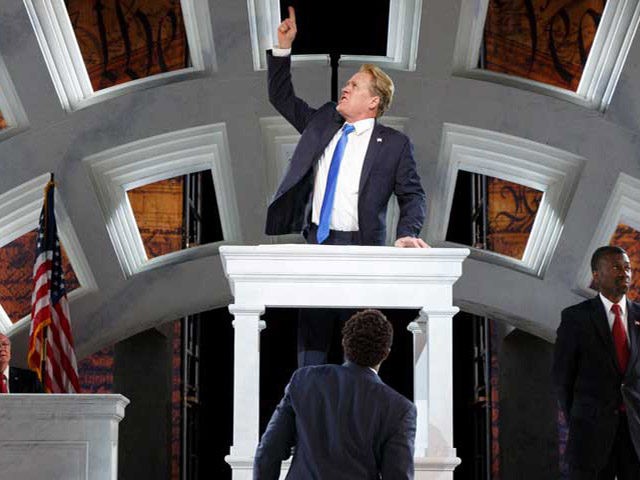Actor Corey Stoll has opened up about his experience starring in the Public Theater’s controversial staging of Julius Caesar this summer, explaining that performing the play in the wake of protests and criticism was itself a form of “resistance.”
In an essay for Vulture, the 41-year-old House of Cards star, who played Marcus Brutus in the play, wrote that he initially did not know the Caesar character would be a stand-in for President Donald Trump, complete with blonde hair and business suit. The character’s resemblance to the president sparked outrage when, as happens in the Shakespeare classic, the Trump-like Caesar is brutally stabbed to death by his associates in the Senate. The controversy led two sponsors of the Public Theater, Delta Air Lines and Bank of America, to pull their funding, while hecklers interrupted the performance during its final few nights.
“The protesters never shut us down, but we had to fight each night to make sure they did not distort the story we were telling,” Stoll wrote. “At that moment, watching my castmates hold their performances together, it occurred to me that this is resistance.”
The actor wrote that he initially disapproved of the Caesar character’s resemblance to Trump, though he had “little fear of offending people” and did not believe anyone would view the play as an “endorsement of violence” against the president.
“Absorbed in our previews, I was unaware that we had become a target of right-wing attacks,” he wrote. “In a company meeting the Friday before our opening night, we were told that some conservative websites claimed to be outraged by the production. Threats had been made. Security was being increased. I raised my hand and asked what we should do if someone tried to stop the show. Some of my castmates laughed. Brutus was making me paranoid.”
Stoll added that by the time of the final performance of the play on June 18, he had become “exhausted and nervous” due to repeated interruptions by hecklers and others audience members who rushed the stage during the assassination scene.
“In this new world where art is willfully misinterpreted to score points and to distract, simply doing the work of an artist has become a political act,” he concluded. “I’m thankful for all the beautiful defenses of our production written in the last few weeks. But the cliché is true: In politics, when you’re explaining, you’re losing. So if you’re making art, by all means question yourself and allow yourself to be influenced by critics of good faith. But don’t allow yourself to be gaslighted or sucked into a bad-faith argument.”
The Public Theater defended its production after the initial backlash, acknowledging in a statement that the play had provoked “heated discussion” but that “such discussion is exactly the goal of our civically-engaged theater; this discourse is the basis of a healthy democracy.”
Read Stoll’s full essay at Vulture.
Follow Daniel Nussbaum on Twitter: @dznussbaum

COMMENTS
Please let us know if you're having issues with commenting.